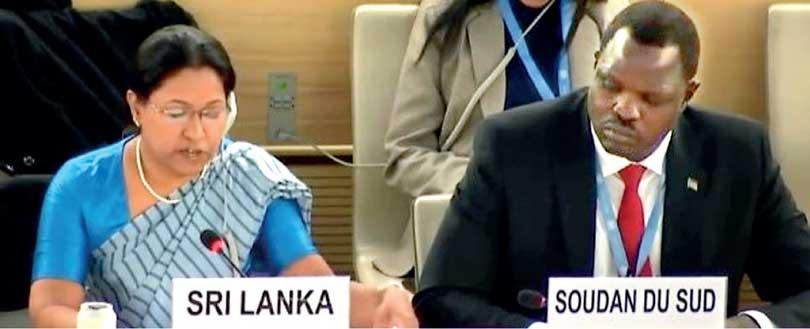05 Mar 2020 - {{hitsCtrl.values.hits}}

The Sri Lankan Government rejected ‘inaccurate’ references made in the UN Special Rapporteur on Freedom of Religion or Belief’s report which has said “serious concerns” regarding “Sri Lankan security forces colluding with mobs and not acting to prevent or stop violence” in the aftermath of the Easter Sunday attacks.
The government said this in a statement issued at the interactive dialogue of the 43rd session of the Human Rights Council responding to the Special Rapporteur on Freedom of Religion or Belief Ahmed Shaheed on Monday.
The Special Rapporteur’s report following his visit to Sri Lanka from August 15 to 26, 2019 has been presented to the Council on Monday.
Responding to the report, the Sri Lankan delegation said the Easter Sunday attacks reminded us that we are fighting a common adversary in terrorism, radicalization and extremism, which is a global threat.
“In this context, we consider it unfortunate that the SR’s report has, to a large extent, sought to judge the space for freedom of religion or belief in Sri Lanka through the few months that followed the Easter Sunday attacks,” they said.
The statement further said, “It is regrettable that these inaccurate accounts have been included in the report, even after they have been fully rebutted and explained by the Government soon after the alleged incidents.
With regard to references to restrictions on dress code, it is noted that the regulation concerned was a temporary measure under the Emergency Regulations aimed at preventing concealing of identity, in view of the imminent security threat that existed at the time.
Sri Lanka also categorically rejects the inaccurate assertion in the report that the International Covenant on Civil and Political Rights (ICCPR) Act has not been applied to protect minorities but has become a “repressive tool” curtailing freedom of religion or belief.
We wish to point out that since its enactment in 2007 to date, 90% of the suspects who were arrested under the ICCPR Act have been from the majority Sinhala community. With regard to comments made in the report about alleged discrimination based on “supremacy” of Buddhism over other religions, we wish to highlight that as per Article 9 the Constitution requires the State to protect and foster the Buddha Sasana while assuring all religions the rights granted under the Constitution.
No provision in Sri Lanka’s Constitution or national laws permits discrimination of an individual based on religion or belief in any sphere of public life. On the contrary, Article 12 of the Constitution prohibits discrimination based on race, religion, language, caste, sex, political opinion, place of birth or any such grounds.
In describing attacks against and desecration of places of worship, the report has failed to refer to incidents of attacks on and vandalizing of Buddhist places of worship and instances of obstruction of Buddhist devotees in certain areas of the country.
The report also fails to adequately address positive measures undertaken by the Government and the law enforcement agencies to foster religious harmony, such as addressing extremist elements on all sides, payment of compensation through the Office for Reparations to victims of violence, and setting up of mechanisms such as an Inter-Religious Councils.
It is unfortunate that the resilience and solidarity of Sri Lankan’s protecting and assisting fellow citizens of all faiths in the aftermath of April 21, as demonstrated by Buddhists and Christians guarding Muslims at prayer, renovation of damaged property and restoration of damaged churches by the security forces, have not been reflected in the report. Nor has the laudable role played by the independent institutions of Sri Lanka, such as the Human Rights Commission, during this challenging period, received the attention that
it warrants.
We look forward to continuing to engage with the Special Rapporteur and this Council in a constructive and meaningful manner towards this end.”
19 Nov 2024 55 minute ago
19 Nov 2024 55 minute ago
19 Nov 2024 1 hours ago
19 Nov 2024 1 hours ago
19 Nov 2024 2 hours ago